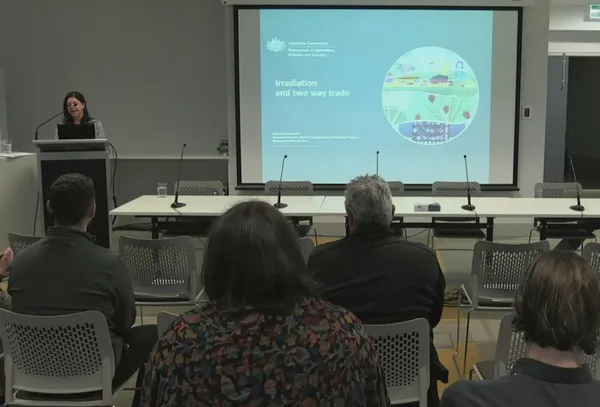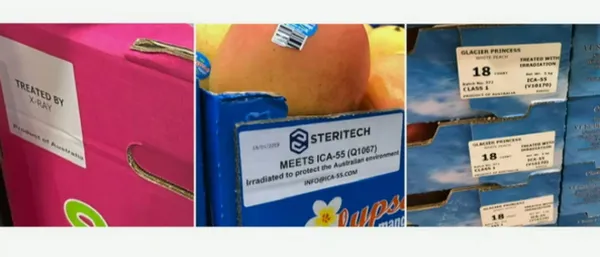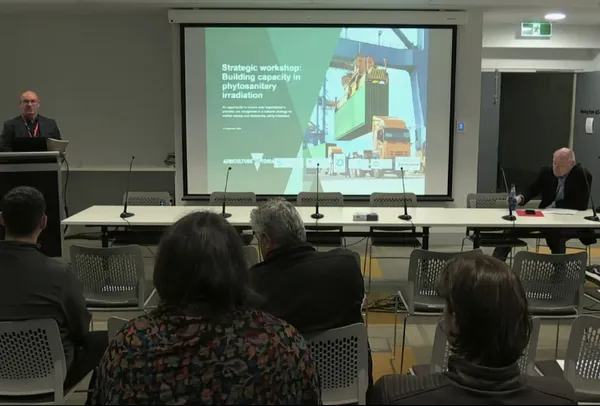The Australian government and horticulture sector leaders are helping to spread the message that phytosanitary irradiation is an effective, safe, and environmentally sustainable treatment for fresh produce.
The Assistant Director of Market Co-ordination and Strategy Group at the Department of Agriculture, Forestry and Fisheries (DAFF) spoke at Australia's first phytosanitary irradiation strategic workshop hosted by Agriculture Victoria in Melbourne.
"Irradiation is simple, effective and can be used across a range of commodities and pests - so it allows for trade in fresher, high-quality produce," Mirianne Jovanoski said.
Irradiation through the controlled use of X-ray treatment is both rapid and cold-chain friendly, delivering superior product quality and shelf life. It is also an important biosecurity tool for Australia as it is effective against all insect pests in all plant and packaging types. However, the benefits do not end there, X-ray treatment is chemical free and is used as an alternative to chemical treatments such as methyl bromide which can impact the ozone layer and be harmful to humans and the environment if not used correctly.

Australian Table Grape Association (ATGA) CEO Jeff Scott also addressed the workshop, saying Australia's export of table grapes to Indonesia had increased significantly in the past two years, while trade to Vietnam was also up 100 per cent last year with the ATGA crediting a large part of that success to the use of irradiation as a treatment. He noted that geographic location meant that Australian produce is often the fastest to Asian markets using air freight, but that fruit quality has been the major focus for the industry as it provided a key point of difference from its competitors.
Australian mangoes are a world leader in terms of utilising irradiation as an end-point treatment to ship fruit internationally, according to Bowen Gumlu Growers Association Chief Executive Officer Ry Collins, with the first shipment sent to New Zealand in 2005. Market share and volumes of Australian mangoes to New Zealand have grown significantly and are now the industry's largest protocol export market by volume. In a major boost for the industry, Australian irradiated mangoes gained access to the United States in 2015.

While retailers in Australia have been slow to accept irradiated fresh produce, the use of irradiation to treat fresh produce is growing fast, with over 700 per cent domestic growth last financial year according to Steritech, who operate Australia’s two irradiation facilities in Melbourne and Brisbane. This in part has been credited to the Melbourne X-ray facility being centrally located to over 50 per cent of all Australian fresh produce movements. Nevertheless, traditional forms of phytosanitary treatment are still required to gain access to international markets where irradiation is not part of existing protocols.
Echoing the needs of many commodities in the horticulture sector, Jeff Scott highlighted the need to improve market access, in particular negotiation of improved market access protocols that include irradiation to high-value markets such as the United States, Japan, South Korea, and China.

Lloyd Kingham, Biosecurity Officer with the NSW Department of Primary Industries stated that World exports are increasing and that 10 per cent are Australian. He claimed Australia is a world leader in the diversified use of irradiation but noted that not all trading partners accept irradiated fresh produce. To grow export volumes in the short term, he suggested that industry consider sending their products to countries that already permit the sale of irradiated fresh produce such as the US, New Zealand, Vietnam, Malaysia, Indonesia, and Thailand. For those countries that do not accept irradiation, he suggested that market access negotiations would be more difficult, but that Australia must focus on “playing the long game” to achieve success. This would involve the Australian Government and industry collaborating with international trade partners on research and development.

Noting the critical role played by the Australian Government in negotiating market access, Ms Jovanoski highlighted that some trading partners have sensitivities concerning the use of irradiation and that we could not immediately demand irradiation as a treatment pathway. Importantly, DAFF continues to promote the success of Australia’s domestic and international trade in irradiated fresh produce when negotiating new market access protocols.
"Market access is based on research and science, which becomes the basis of market access negotiations, but there is often a lag in acceptance of new treatment pathways such as irradiation," she said.
